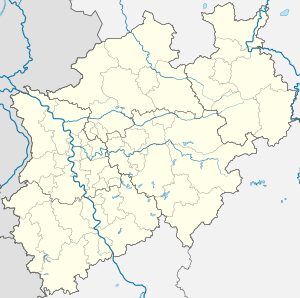Geilenkirchen
Geilenkirchen (German pronunciation: [ˈɡaɪlənkɪʁçən]) is a town in the district Heinsberg, in North Rhine-Westphalia, Germany. It is situated near the border with the Netherlands, on the river Wurm, approx. 15 km (9.3 mi) north-east of Heerlen and 20 km (12.4 mi) north of Aachen.
Geilenkirchen | |
|---|---|
 Coat of arms | |
Location of Geilenkirchen within Heinsberg district  | |
 Geilenkirchen  Geilenkirchen | |
| Coordinates: 50°57′55″N 6°07′10″E | |
| Country | Germany |
| State | North Rhine-Westphalia |
| Admin. region | Köln |
| District | Heinsberg |
| Subdivisions | 13 |
| Government | |
| • Mayor | Georg Schmitz[1] (Ind.) |
| Area | |
| • Total | 83 km2 (32 sq mi) |
| Elevation | 95 m (312 ft) |
| Population (2018-12-31)[2] | |
| • Total | 27,214 |
| • Density | 330/km2 (850/sq mi) |
| Time zone | CET/CEST (UTC+1/+2) |
| Postal codes | 52511 |
| Dialling codes | 02451; 02453; 02462 |
| Vehicle registration | HS, ERK, GK |
| Website | www.geilenkirchen.de |
It was the site of Operation Clipper in November 1944.
The town gives its name to nearby NATO Air Base Geilenkirchen. The base is home to 17 E-3A airborne early warning and control aircraft manned by crews from 14 nations.
On July 24, 2019 the highest temperature ever recorded in Germany was measured in Geilenkirchen with 40.5 degrees Celsius (105 degrees Fahrenheit) during a heat wave that affected much of Europe.[3] The record was broken the following day when temperature in Lingen reached 42.6 degrees Celsius (109 degrees Fahrenheit).[4]
Born in Geilenkirchen
- Ludolf Camphausen (1803-1890), banker, Prussian minister president in the revolutionary year 1848
- Otto von Camphausen (1812-1896), Prussian Finance Minister
- Christoph Dohmen (born 1957), professor of the Old Testament at the University of Regensburg
- Hans Meyer (1900-1962), German physician and ministerial official
- Max Wilms (1867-1918), German physician and surgeon
References
- Geilenkirchen | Rathaus | Beschäftigte von A-Z | Bürgermeister
- "Bevölkerung der Gemeinden Nordrhein-Westfalens am 31. Dezember 2018" (in German). Landesbetrieb Information und Technik NRW. Retrieved 10 July 2019.
- https://www.faz.net/aktuell/gesellschaft/40-5-grad-neuer-hitzerekord-fuer-deutschland-in-geilenkirchen-gemessen-16301415.html
- https://www.nwzonline.de/blaulicht/offenbach-lingen-messwert-in-lingen-42-6-grad-deutschlands-hitzerekord-im-emsland-gebrochen_a_50,5,1605835914.html